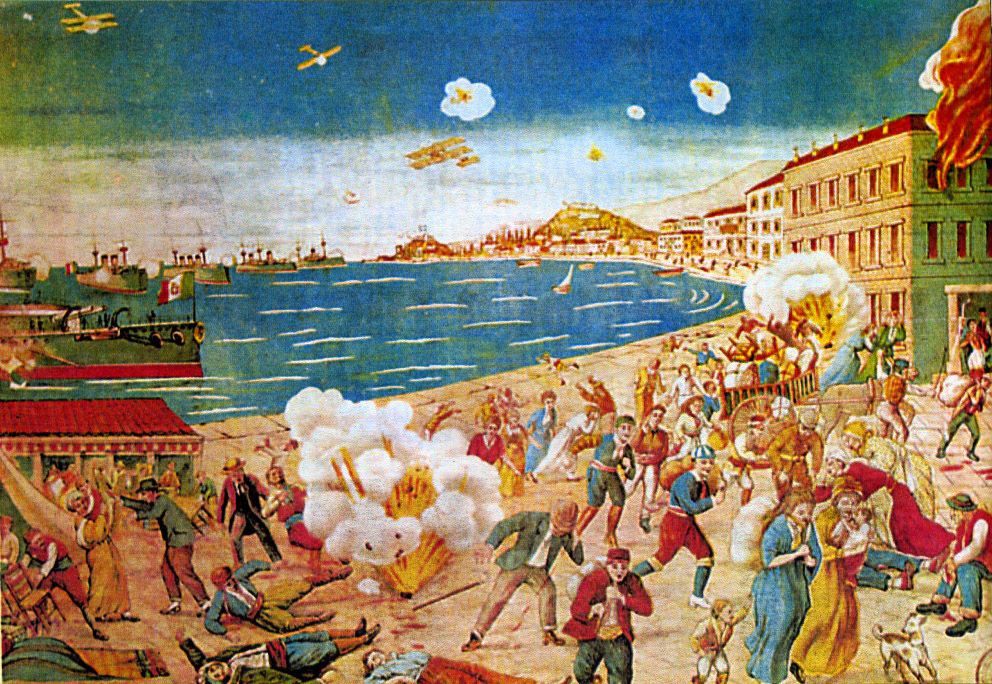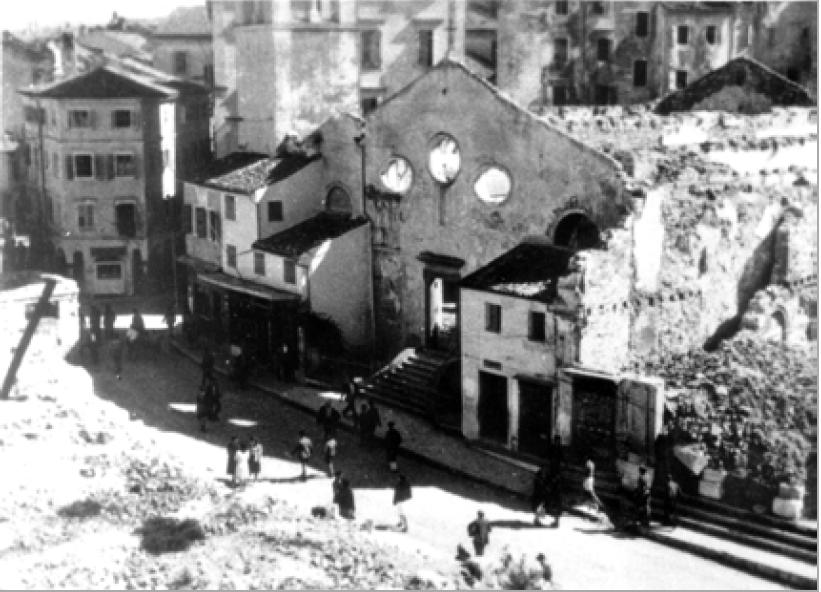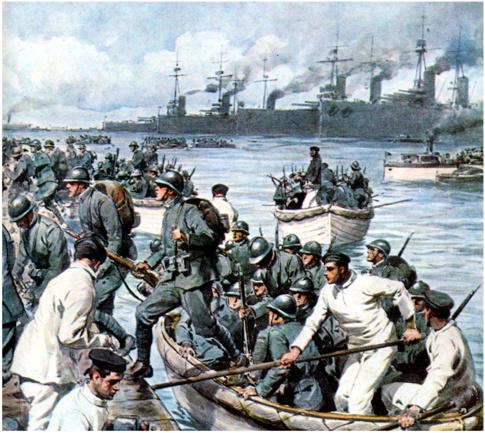
In 1923, the Fascists occupied Corfu for twenty‐eight days, and only evacuated after Athens met Rome’s terrorist demands. While four weeks of occupation may seem ‘insignificant’ to some, this show of force should have been a warning to Europe that the Fascists meant business, and that they did not have to limit their exploits to Africa; it was a step towards their dream empire. Quoting from J. S. Papafloratos’s The Fiume and the Corfu Incidents:
On August 27th, 1923, the members of the international commission for the delineation of the Greek–Albanian borders started out in automobiles to do their work once again. The Italian car was last in the line and three officers, an interpreter and a driver were riding in it. In the 54th km, near Zepi (inside the Greek territory), unknown persons ambushed and killed General Enrico Tellini and the other members of the Italian delegation.
The murderers then evidently crossed the border and escaped in Albania. The name and the nationality of the murderers are still unknown^9^. In [Fascist] Italy, there was a perfect flare‐up of national pride and patriotic sentiment^10^. Mussolini at once drew up and sent out an ultimatum to the Greek government (on August 29th). He assumed, without a proof, that the responsibility for the murder belonged to the Greeks. The demands made in the ultimatum were extremely severe and the Greek government, by common consent outside of Italian circles, could not accept them^11^.
The comparison with the Austro‐Hungarian ultimatum sent to Serbia in July 1914 was inevitable^12^. The isolated Greek government^13^ accepted the ultimatum partially, because the Greek responsibility for the crime had not been proved. The resent research proved that Mussolini did not wait for the official reply of the Greek government and he had ordered a fleet of more than fifteen battleships to occupy the island of Corfu, on August 31st.
Although the [Duce] did not authorize the use of force against a demilitarized island, the [Fascist] commander Admiral Solari ordered the bombardment of the two castles of the island relating to the Middle Ages. These castles were full of refugees from Asia Minor. As a result, fifteen women and children were killed. This incident aggravated the diplomatic position of [Fascist] Italy. On September 1st, the Greek government appealed to the League of Nations without making any reference at the bombardment and the innocent victims in Corfu. Fiume and Corfu were already connected as aspects of [Rome’s] Balkan policy. But, the Greek recourse to the League of Nations made their interaction even stronger.

Pictured: The Church of Annunciata shortly after the Fascists bombarded it.

Pictured: Artist’s impression of the (first) Fascist invasion of Corfu.
Mussolini was very happy to see that there was no agreement between Athens and Belgrade. Momcilo Ninčić, was keen to reconcile with Italy and he said that his government would send no troops in the area^48^. A day earlier, Lord Curzon, then Foreign Minister of the British government, had accepted the French plan for the evacuation of Corfu.
According to this, the Greek government was found guilty for the murder of the members of the Italian delegation. The Greek government should compensate the [Fascist] one without receiving any satisfaction for the murdered refugees from Asia Minor, who were killed by the [Fascist] bombs. On September 27th, the Greek government was obliged to accept the decision of the Conference of Ambassadors in order to liberate Corfu. Mussolini’s new foreign policy appeared to be effective.
As long as the Fiume case was concerned, on January 27th, 1924, the Treaty of Rome was signed. The Kingdom of Serbs, Croats and Slovenes formally recognized Italy’s full and entire sovereignty over the city and the port of Fiume. The rest of the Free State together with port Baros was ceded to Slovenia in conformity with the pledges given by Count Sforza.
To this agreement was added, at Belgrade’s request, a general treaty of friendship, which bound both countries to preserve the peace settlement. Italy ratified the Fiume agreement on February 22nd. On the same day, a Royal Decree annexing Fiume to the Kingdom of Italy appeared in the Official Gazette^49^. Mussolini was rewarded with the Collar of the Annunziata Order, the highest distinction, which the King could bestow on him^50^.
He […] followed a very clever policy in order to achieve his goal. Mussolini succeeded in receiving a compensation for the murder of the members of the Italian delegation in Kakavia and he was capable to avoid to loose face in the League of Nations. Moreover, he managed to annex Fiume to [Fascist] Italy. He used the French uneasiness in Ruhr in order to secure Paris’ assistance as long as Belgrade was concerned.
It is true that the French government used all its influence in Belgrade in order to persuade it to compensate and not to form a Balkan bloc with Athens. In addition, the Italian PM took advantage of the internal decline and the division among the nations of the Kingdom of Serbs, Croats and Slovenes and the external isolation of the Greek government. He also realized the effect of the use of force upon a weak and unstable government such as the Greek one of that time.
It is doubtful if he could persuade the Serbs to retreat without the bombardment of Corfu, which proved his will to adopt any possible measure. On the other hand, the League of Nations acted in a very insufficient way in order to fulfill mainly the interests of the Great Powers. The well‐known tendency of the Balkan history to separate the states according to the will of the Great Powers was also proved. Viewed in retrospect, this bombardment was the key to unlock Fiume’s door.
(Emphasis added in all cases.)
Unfortunately, this would not be the only time that Fascism came to Corfu. Thanks to the Third Reich’s assistance, the Fascists reoccupied Corfu on April 1941.
Further reading: France and the Corfu-Fiume Crisis of 1923, ‘Consistently with Honour’: Great Britain, the League of Nations and the Corfu Crisis of 1923, Ireland and the Corfu Crisis, 1923 & The Corfu Incident of 1923: Mussolini and The League of Nations
Other events that happened today (August 31):
1935: In an attempt to stay out of the growing tensions concerning the Third Reich and the Empire of Japan, Washington passed the first of its Neutrality Acts.
1939: The Third Reich mounted a false flag attack on the Gleiwitz radio station, creating an excuse to assault Poland the following day.
1941: Serbian paramilitary forces defeated the Wehrmacht in the Battle of Loznica.